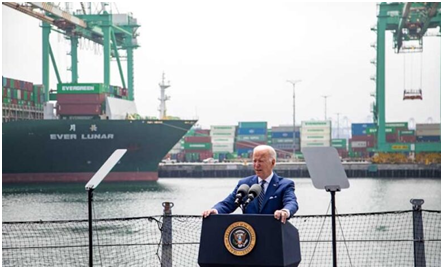
Election year in the US with hysteria
growing by the day about a more strident China has seen the White House take
action over a perceived threat at its ports.
President Joe Biden signed 21 Feb an
executive order giving the coast guard greater powers to police cyber security
at ports, as well as setting in place a plan to replace the nation’s
Chinese-built port cranes with Japanese ones over concerns they could be fitted
with spy devices. “These cranes, because they are essentially moving
the large-scale containers in and out of port, if they were encrypted in a
criminal attack, or rented or operated by an adversary, that could have real
impact on our economy’s movement of goods and our military’s movement of goods
through ports,” said Anne Neuberger, deputy national security adviser for cyber
and emerging technology.
Around 80% of the cranes used in
American ports are made in China and use Chinese software. Biden has earmarked $20bn over the
next five years to get these replaced by a US subsidiary of Mitsui.
American
maritime assets were reportedly being targeted last year by Volt Typhoon, a
Chinese state-sponsored snooping operation, according to tech giant Microsoft.
Microsoft said it had uncovered
“stealthy and targeted malicious activity” focused on post-compromise
credential access and network system discovery aimed at critical infrastructure
organisations in the US. The attack is carried out by Volt Typhoon, a
state-sponsored actor based in China that typically focuses on espionage and
information gathering. According to Microsoft, Volt Typhoon has been active
since mid-2021 and has targeted critical infrastructure organisations in Guam
and elsewhere in the US. In this campaign, the affected organisations span the
communications, manufacturing, utility, transportation, construction, maritime,
government, information technology, and education sectors.
“Observed
behavior suggests that the threat actor intends to perform espionage and
maintain access without being detected for as long as possible,” Microsoft
stated in an update on its site…Shipping
is well aware of the threat posed by state-backed malware.
A major
cyber security report published by Thetius, CyberOwl and HFW detailed many
recent cyber incidents including how the Stena Impero tanker’s GPS was spoofed
to force it to cross into Iranian waters unintentionally in 2019 with the ship
and its crew then held for months….Other key takeaways from the 43-page report
include news that CyberOwl discovered nation-state malware on systems onboard
seven separate vessels belonging to a large liner fleet. The malware belonged
to the PlugX family, which is designed to provide the attacker remote access to
the affected system, followed by full admin control of the machine without
permission or authorisation. This
includes the ability to manipulate files, execute commands, and spread locally.
The particular malware variant was first discovered in 2020 and linked to
political espionage on foreign nations.